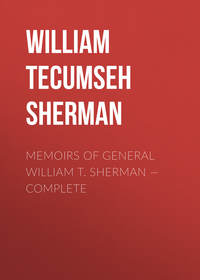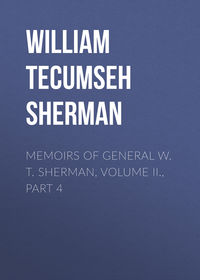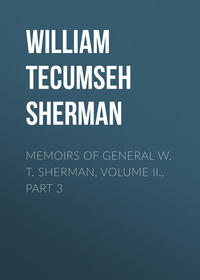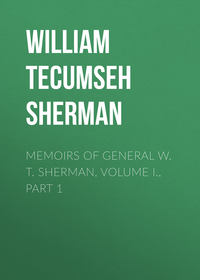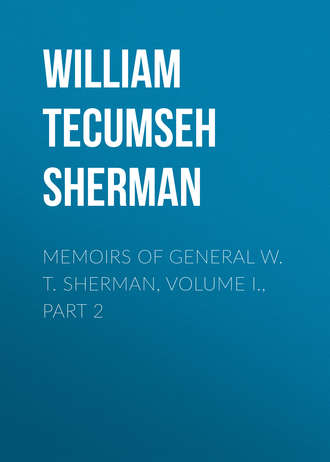 полная версия
полная версияMemoirs of General W. T. Sherman, Volume I., Part 2
In a few minutes the battle of "Shiloh" began with extreme fury, and lasted two days. Its history has been well given, and it has been made the subject of a great deal of controversy. Hildebrand's brigade was soon knocked to pieces, but Buckland's and McDowell's kept their organization throughout. Stuart's was driven back to the river, and did not join me in person till the second day of the battle. I think my several reports of that battle are condensed and good, made on the spot, when all the names and facts were fresh in my memory, and are herewith given entire:
HEADQUARTERS FIRST DIVISION
PITTSBURG LANDING, March 17, 1862
Captain Wm. McMICHAEL, Assistant Adjutant-General to General C. F SMITH, Savannah, Tennessee.
SIR: Last night I dispatched a party of cavalry, at 6 p.m., under the command of Lieutenant-Colonel Heath, Fifth Ohio Cavalry, for a strong reconnoissance, if possible, to be converted into an attack upon the Memphis road. The command got off punctually, followed at twelve o'clock at night by the First Brigade of my division, commanded by Colonel McDowell, the other brigades to follow in order.
About one at night the cavalry returned, reporting the road occupied in force by the enemy, with whose advance-guard they skirmished, driving them back—about a mile, taking two prisoners, and having their chief guide, Thomas Maxwell, Esq., and three men of the Fourth Illinois wounded.
Inclosed please find the report of Lieutenant-Colonel Heath; also a copy of his instructions, and the order of march. As soon as the cavalry returned, I saw that an attempt on the road was frustrated, and accordingly have placed McDowell's brigade to our right front, guarding the pass of Snake Creek; Stuart's brigade to the left front, to watch the pass of Lick Creek; and I shall this morning move directly out on the Corinth road, about eight miles to or toward Pea Ridge, which is a key-point to the southwest.
General Hurlbut's division will be landed to-day, and the artillery and infantry disposed so as to defend Pittsburg, leaving my division entire for any movement by land or water.
As near as I can learn, there are five regiments of rebel infantry at Purdy; at Corinth, and distributed along the railroad to Inca, are probably thirty thousand men; but my information from prisoners is very indistinct. Every road and path is occupied by the enemy's cavalry, whose, orders seem to be, to fire a volley, retire, again fire and retire. The force on the Purdy road attacked and driven by Major Bowman yesterday, was about sixty strong. That encountered last night on the Corinth road was about five companies of Tennessee cavalry, sent from Purdy about 2 p.m. yesterday.
I hear there is a force of two regiments on Pea Ridge, at the point where the Purdy and Corinth roads come together.
I am satisfied we cannot reach the Memphis & Charleston road without a considerable engagement, which is prohibited by General Halleck's instructions, so that I will be governed by your orders of yesterday, to occupy Pittsburg strongly, extend the pickets so as to include a semicircle of three miles, and push a strong reconnoissance as far out as Lick Creek and Pea Ridge.
I will send down a good many boats to-day, to be employed as you may direct; and would be obliged if you would send a couple of thousand sacks of corn, as much hay as you can possibly spare, and, if possible, a barge of coal.
I will send a steamboat under care of the gunboat, to collect corn from cribs on the river-bank.
I have the honor to be your obedient servant,
W. T. SHERMAN,
Brigadier-General, commanding First Division.
HEADQUARTERS, STEAMBOAT CONTINENTAL, Pittsburg, March 18, 1882.
Captain RAWLINS, Assistant Adjutant-General to General GRANT.
SIR: The division surgeon having placed some one hundred or more sick on board the Fanny Bullitt, I have permitted her to take them to Savannah. There is neither house nor building of any kind that can be used for a hospital here.
I hope to receive an order to establish floating hospitals, but in the mean time, by the advise of the surgeon, allow these sick men to leave. Let me hope that it will meet your approbation.
The order for debarkation came while General Sherman was absent with three brigades, and no men are left to move the effects of these brigades.
The landing, too, is small, with scarcely any chance to increase it; therefore there is a great accumulation of boats. Colonel McArthur has arrived, and is now cutting a landing for himself.
General Sherman will return this evening. I am obliged to transgress, and write myself in the mean time,
Respectfully your obedient servant,
J. H. HAMMOND, Assistant Adjutant-General.
P. S—4 p.m.—Just back; have been half-way to Corinth and to Purdy. All right. Have just read this letter, and approve all but floating hospitals; regimental surgeons can take care of all sick, except chronic cases, which can always be sent down to Paducah.
Magnificent plain for camping and drilling, and a military point of great strength. The enemy has felt us twice, at great loss and demoralization; will report at length this evening; am now much worn out.
W. T. SHERMAN, Brigadier-General.
HEADQUARTERS FIRST DIVISION
Pittsburg Landing, March 19, 1862.
Captain RAWLINS, Assistant Adjutant-General to General GRANT, Savannah, Tennessee.
SIR: I have just returned from an extensive reconnoissance toward Corinth and Purdy, and am strongly impressed with the importance of this position, both for its land advantages and its strategic position. The ground itself admits of easy defense by a small command, and yet affords admirable camping-ground for a hundred thousand men. I will as soon as possible make or cause to be made a topographical sketch of the position. The only drawback is that, at this stage of water, the space for landing is contracted too much for the immense fleet now here discharging.
I will push the loading and unloading of boats, but suggest that you send at once (Captain Dodd, if possible) the best quartermaster you can, that he may control and organize this whole matter. I have a good commissary, and will keep as few provisions afloat as possible. Yours, etc.,
W. T. SHERMAN, Brigadier-General commanding.
HEADQUARTERS SHERMAN'S DIVISION
Camp Shiloh, near Pittsburg Landing, Tennessee, April 2, 1862
Captain J. A. RAWLINS, Assistant Adjutant-General to General GRANT.
SIR: In obedience to General Grant's instructions of March 31st, with one section of Captain Muench's Minnesota Battery, two twelve-pound howitzers, a detachment of Fifth Ohio Cavalry of one hundred and fifty men, under Major Ricker, and two battalions of infantry from the Fifty-seventh and Seventy-seventh Ohio, under the command of Colonels Hildebrand and Mungen, I marched to the river, and embarked on the steamers Empress and Tecumseh. The gunboat Cairo did not arrive at Pittsburg, until after midnight, and at 6 p.m. Captain Bryant, commanding the gunboat, notified me that he was ready to proceed up the river. I followed, keeping the transports within about three hundred yards of the gunboat. About 1 p.m., the Cairo commenced shelling the battery above the mouth of Indian Creek, but elicited no reply. She proceeded up the river steadily and cautiously, followed close by the Tyler and Lexington, all throwing shells at the points where, on former visits of the gunboats, enemy's batteries were found. In this order all followed, till it was demonstrated that all the enemy's batteries, including that at Chickasaw, were abandoned.
I ordered the battalion of infantry under Colonel Hildebrand to disembark at Eastport, and with the other battalion proceeded to Chickasaw and landed. The battery at this point had evidently been abandoned some time, and consisted of the remains of an old Indian mound, partly washed away by the river, which had been fashioned into a two-gun battery, with a small magazine. The ground to its rear had evidently been overflowed during the late freshet, and led to the removal of the guns to Eastport, where the batteries were on high, elevated ground, accessible at all seasons from the country to the rear.
Upon personal inspection, I attach little importance to Chickasaw as a military position. The people, who had fled during the approach of the gunboats, returned to the village, and said the place had been occupied by one Tennessee regiment and a battery of artillery from Pensacola. After remaining at Chickasaw some hours, all the boats dropped back to Eastport, not more than a mile below, and landed there. Eastport Landing during the late freshet must have been about twelve feet under water, but at the present stage the landing is the best I have seen on the Tennessee River.
The levee is clear of trees or snags, and a hundred boats could land there without confusion.
The soil is of sand and gravel, and very firm. The road back is hard, and at a distance of about four hundred yards from the water begin the gravel hills of the country. The infantry scouts sent out by Colonel Hildebrand found the enemy's cavalry mounted, and watching the Inca road, about two miles back of Eastport. The distance to Inca is only eight miles, and Inca is the nearest point and has the best road by which the Charleston & Memphis Railroad can be reached. I could obtain no certain information as to the strength of the enemy there, but am satisfied that it would have been folly to have attempted it with my command. Our object being to dislodge the enemy from the batteries recently erected near Eastport, and this being attained, I have returned, and report the river to be clear to and beyond Chickasaw.
I have the honor to be, your obedient servant,
W. T. SHERMAN,
Brigadier-General commanding Division.
HEADQUARTERS FIFTH DIVISION
CAMP SHILOH, April 5, 1862.
Captain J. A. RAWLINS, Assistant Adjutant-General, District of Western Tennessee.
SIR: I have the honor to report that yesterday, about 3 p.m., the lieutenant commanding and seven men of the advance pickets imprudently advanced from their posts and were captured. I ordered Major Ricker, of the Fifth Ohio Cavalry, to proceed rapidly to the picket-station, ascertain the truth, and act according to circumstances. He reached the station, found the pickets had been captured as reported, and that a company of infantry sent by the brigade commander had gone forward in pursuit of some cavalry. He rapidly advanced some two miles, and found them engaged, charged the enemy, and drove them along the Ridge road, till he met and received three discharges of artillery, when he very properly wheeled under cover, and returned till he met me.
As soon as I heard artillery, I advanced with two regiments of infantry, and took position, and remained until the scattered companies of infantry and cavalry had returned. This was after night.
I infer that the enemy is in some considerable force at Pea Ridge, that yesterday morning they crossed a brigade of two regiments of infantry, one regiment of cavalry, and one battery of field-artillery, to the ridge on which the Corinth road lies. They halted the infantry and artillery at a point abort five miles in my front, sent a detachment to the lane of General Meeks, on the north of Owl Creek, and the cavalry down toward our camp. This cavalry captured a part of our advance pickets, and afterward engaged the two companies of Colonel Buckland's regiment, as described by him in his report herewith inclosed. Our cavalry drove them back upon their artillery and Infantry, killing many, and bringing off ten prisoners, all of the First Alabama Cavalry, whom I send to you.
We lost of the pickets one first-lieutenant and seven men of the Ohio Seventieth Infantry (list inclosed); one major, one lieutenant, and one private of the Seventy-second Ohio, taken prisoners; eight privates wounded (names in full, embraced in report of Colonel Buckland, inclosed herewith).
We took ten prisoners, and left two rebels wounded and many killed on the field.
I have the honor to be, your obedient servant,
W. T. SHERMAN,
Brigadier-General, commanding Division.
HEADQUARTERS FIFTH DIVISION
Camp Shiloh, April 10, 1862.
Captain J. A. RAWLINS, Assistant Adjutant-General to General GRANT.
SIR: I had the honor to report that, on Friday the 4th inst., the enemy's cavalry drove in our pickets, posted about a mile and a half in advance of my centre, on the main Corinth road, capturing one first-lieutenant and seven men; that I caused a pursuit by the cavalry of my division, driving them back about five miles, and killing many. On Saturday the enemy's cavalry was again very bold, coming well down to our front; yet I did not believe they designed any thing but a strong demonstration. On Sunday morning early, the 6th inst., the enemy drove our advance-guard back on the main body, when I ordered under arms all my division, and sent word to General McClernand, asking him to support my left; to General Prentiss, giving him notice that the enemy was in our front in force, and to General Hurlbut, asking him to support General Prentiss. At that time—7 a.m.—my division was arranged as follows:
First Brigade, composed of the Sixth Iowa, Colonel J. A. McDowell;
Fortieth Illinois, Colonel Hicks; Forty-sixth Ohio, Colonel Worthington; and the Morton battery, Captain Behr, on the extreme right, guarding the bridge on the Purdy road over Owl Creek.
Second Brigade, composed of the Fifty-fifth Illinois, Colonel D. Stuart; the Fifty-fourth Ohio, Colonel T. Kilby Smith; and the Seventy-first Ohio, Colonel Mason, on the extreme left, guarding the ford over Lick Creek.
Third Brigade, composed of the Seventy-seventh Ohio, Colonel Hildebrand; the Fifty-third Ohio, Colonel Appler; and the Fifty-seventh Ohio, Colonel Mungen, on the left of the Corinth road, its right resting on Shiloh meeting-house.
Fourth Brigade, composed of the Seventy-second Ohio, Colonel Buckland; the Forty-eighth Ohio, Colonel Sullivan; and the Seventieth Ohio, Colonel Cookerill, on the right of the Corinth road, its left resting on Shiloh meeting-house.
Two batteries of artillery—Taylor's and Waterhouse's—were posted, the former at Shiloh, and the latter on a ridge to the left, with a front-fire over open ground between Mungen's and Appler's regiments. The cavalry, eight companies of the Fourth Illinois, under Colonel Dickey, were posted in a large open field to the left and rear of Shiloh meeting-house, which I regarded as the centre of my position.
Shortly after 7 a.m., with my entire staff, I rode along a portion of our front, and when in the open field before Appler's regiment, the enemy's pickets opened a brisk fire upon my party, killing my orderly, Thomas D. Holliday, of Company H, Second Illinois Cavalry. The fire came from the bushes which line a small stream that rises in the field in front of Appler's camp, and flows to the north along my whole front.
This valley afforded the enemy partial cover; but our men were so posted as to have a good fire at them as they crossed the valley and ascended the rising ground on our side.
About 8 a.m. I saw the glistening bayonets of heavy masses of infantry to our left front in the woods beyond the small stream alluded to, and became satisfied for the first time that the enemy designed a determined attack on our whole camp.
All the regiments of my division were then in line of battle at their proper posts. I rode to Colonel Appler, and ordered him to hold his ground at all hazards, as he held the left flank of our first line of battle, and I informed him that he had a good battery on his right, and strong support to his rear. General McClernand had promptly and energetically responded to my request, and had sent me three regiments which were posted to protect Waterhouse's battery and the left flank of my line.
The battle opened by the enemy's battery, in the woods to our front, throwing shells into our camp. Taylor's and Waterhouse's batteries promptly responded, and I then observed heavy battalions of infantry passing obliquely to the left, across the open field in Appler's front; also, other columns advancing directly upon my division. Our infantry and artillery opened along the whole line, and the battle became general. Other heavy masses of the enemy's forces kept passing across the field to our left, and directing their course on General Prentiss. I saw at once that the enemy designed to pass my left flank, and fall upon Generals McClernand and Prentiss, whose line of camps was almost parallel with the Tennessee River, and about two miles back from it. Very soon the sound of artillery and musketry announced that General Prentiss was engaged; and about 9 A. M. I judged that he was falling back. About this time Appler's regiment broke in disorder, followed by Mungen's regiment, and the enemy pressed forward on Waterhouse's battery thereby exposed.
The three Illinois regiments in immediate support of this battery stood for some time; but the enemy's advance was so vigorous, and the fire so severe, that when Colonel Raith, of the Forty-third Illinois, received a severe wound and fell from his horse, his regiment and the others manifested disorder, and the enemy got possession of three guns of this (Waterhouse's) battery. Although our left was thus turned, and the enemy was pressing our whole line, I deemed Shiloh so important, that I remained by it and renewed my orders to Colonels McDowell and Buckland to hold their ground; and we did hold these positions until about 10 a.m., when the enemy had got his artillery to the rear of our left flank and some change became absolutely necessary. Two regiments of Hildebrand's brigade—Appler's and Mungen's—had already disappeared to the rear, and Hildebrand's own regiment was in disorder. I therefore gave orders for Taylor's battery—still at Shiloh—to fall back as far as the Purdy and Hamburg road, and for McDowell and Buckland to adopt that road as their new line. I rode across the angle and met Behr's battery at the cross-roads, and ordered it immediately to come into battery, action right. Captain Behr gave the order, but he was almost immediately shot from his horse, when drivers and gunners fled in disorder, carrying off the caissons, and abandoning five out of six guns, without firing a shot. The enemy pressed on, gaining this battery, and we were again forced to choose a new line of defense. Hildebrand's brigade had substantially disappeared from the field, though he himself bravely remained. McDowell's and Buckland's brigades maintained their organizations, and were conducted by my aides, so as to join on General McClernand's right, thus abandoning my original camps and line. This was about 10 1/2 a.m., at which time the enemy had made a furious attack on General McClernand's whole front. He straggled most determinedly, but, finding him pressed, I moved McDowell's brigade directly against the left flank of the enemy, forced him back some distance, and then directed the men to avail themselves of every cover-trees, fallen timber, and a wooded valley to our right. We held this position for four long hours, sometimes gaining and at others losing ground; General McClernand and myself acting in perfect concert, and struggling to maintain this line. While we were so hard pressed, two Iowa regiments approached from the rear, but could not be brought up to the severe fire that was raging in our front, and General Grant, who visited us on that ground, will remember our situation about 3 p.m.; but about 4 p.m. it was evident that Hurlbut's line had been driven back to the river; and knowing that General Lew Wallace was coming with reinforcements from Cramp's Landing, General McClernand and I, on consultation, selected a new line of defense, with its right covering a bridge by which General Wallace had to approach. We fell back as well as we could, gathering in addition to our own such scattered forces as we could find, and formed the new line.
During this change the enemy's cavalry charged us, but were handsomely repulsed by the Twenty-ninth Illinois Regiment. The Fifth Ohio Battery, which had come up, rendered good service in holding the enemy in check for some time, and Major Taylor also came up with another battery and got into position, just in time to get a good flank-fire upon the enemy's column, as he pressed on General McClernand's right, checking his advance; when General McClernand's division made a fine charge on the enemy and drove him back into the ravines to our front and right. I had a clear field, about two hundred yards wide, in my immediate front, and contented myself with keeping the enemy's infantry at that distance during the rest of the day. In this position we rested for the night.
My command had become decidedly of a mixed character. Buckland's brigade was the only one that retained its organization. Colonel Hildebrand was personally there, but his brigade was not. Colonel McDowell had been severely injured by a fall off his horse, and had gone to the river, and the three regiments of his brigade were not in line. The Thirteenth Missouri, Colonel Crafts J. Wright, had reported to me on the field, and fought well, retaining its regimental organization; and it formed a part of my line during Sunday night and all Monday. Other fragments of regiments and companies had also fallen into my division, and acted with it during the remainder of the battle. General Grant and Buell visited me in our bivouac that evening, and from them I learned the situation of affairs on other parts of the field. General Wallace arrived from Crump's Landing shortly after dark, and formed his line to my right rear. It rained hard during the night, but our men were in good spirits, lay on their arms, being satisfied with such bread and meat as could be gathered at the neighboring camps, and determined to redeem on Monday the losses of Sunday.
At daylight of Monday I received General Grant's orders to advance and recapture our original camps. I dispatched several members of my staff to bring up all the men they could find, especially the brigade of Colonel Stuart, which had been separated from the division all the day before; and at the appointed time the division, or rather what remained of it, with the Thirteenth Missouri and other fragments, moved forward and reoccupied the ground on the extreme right of General McClernand's camp, where we attracted the fire of a battery located near Colonel McDowell's former headquarters. Here I remained, patiently waiting for the sound of General Buell's advance upon the main Corinth road. About 10 a.m. the heavy firing in that direction, and its steady approach, satisfied me; and General Wallace being on our right flank with his well-conducted division, I led the head of my column to General McClernand's right, formed line of battle, facing south, with Buckland's brigade directly across the ridge, and Stuart's brigade on its right in the woods; and thus advanced, steadily and slowly, under a heavy fire of musketry and artillery. Taylor had just got to me from the rear, where he had gone for ammunition, and brought up three guns, which I ordered into position, to advance by hand firing. These guns belonged to Company A, Chicago Light Artillery, commanded by Lieutenant P. P. Wood, and did most excellent service. Under cover of their fire, we advanced till we reached the point where the Corinth road crosses the line of McClernand's camp, and here I saw for the first time the well-ordered and compact columns of General Buell's Kentucky forces, whose soldierly movements at once gave confidence to our newer and less disciplined men. Here I saw Willich's regiment advance upon a point of water-oaks and thicket, behind which I knew the enemy was in great strength, and enter it in beautiful style. Then arose the severest musketry-fire I ever heard, and lasted some twenty minutes, when this splendid regiment had to fall back. This green point of timber is about five hundred yards east of Shiloh meeting-home, and it was evident here was to be the struggle. The enemy could also be seen forming his lines to the south. General McClernand sending to me for artillery, I detached to him the three guns of Wood's battery, with which he speedily drove them back, and, seeing some others to the rear, I sent one of my staff to bring them forward, when, by almost providential decree, they proved to be two twenty-four pound howitzers belonging to McAlister's battery, and served as well as guns ever could be.
This was about 2 p.m. The enemy had one battery close by Shiloh, and another near the Hamburg road, both pouring grape and canister upon any column of troops that advanced upon the green point of water-oaks. Willich's regiment had been repulsed, but a whole brigade of McCook's division advanced beautifully, deployed, and entered this dreaded wood. I ordered my second brigade (then commanded by Colonel T. Kilby Smith, Colonel Smart being wounded) to form on its right, and my fourth brigade, Colonel Buckland, on its right; all to advance abreast with this Kentucky brigade before mentioned, which I afterward found to be Rousseau's brigade of McCook's division. I gave personal direction to the twenty-four pounder guns, whose well-directed fire first silenced the enemy's guns to the left, and afterward at the Shiloh meeting-house.




